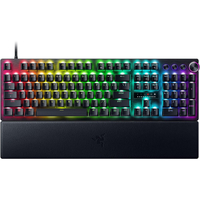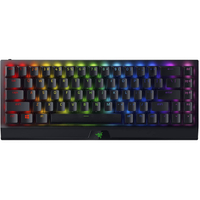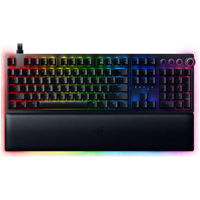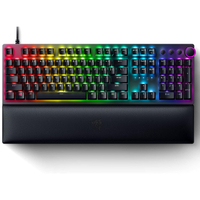Best Razer keyboards 2025: all the brand's top gaming decks
Razer keyboards are some of the best in the business, and these are our favorites for sheer power and value
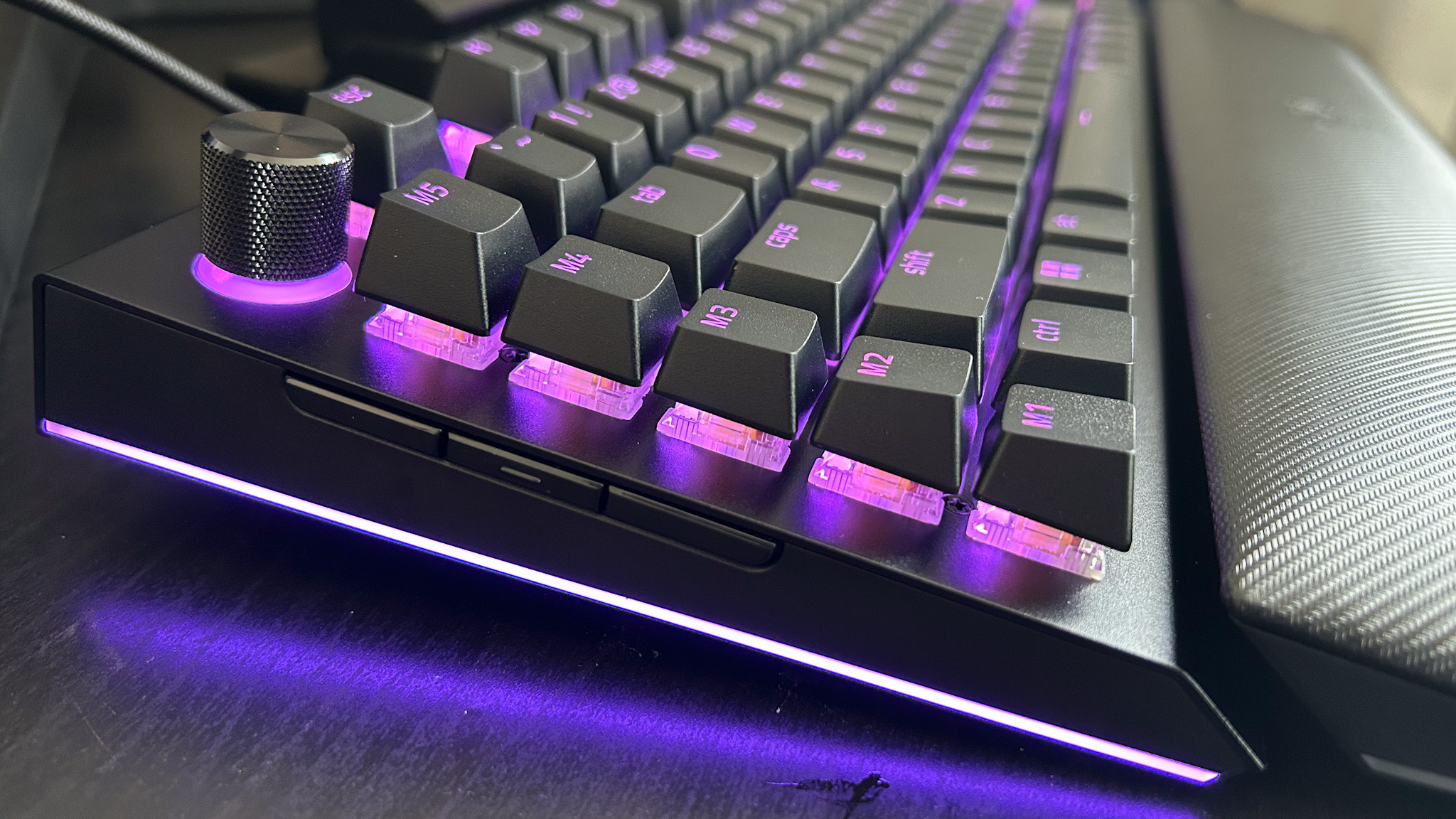
There's a reason so many opt for one of the best Razer keyboards in their setup. These decks are comfortable, reliable, and fast - and newer releases can come with some surprising extra features as well. From the macro-heavy BlackWidow V4 Pro to the adjustable switches in the Mini Analog, there are plenty of different models to choose from - each offering its own skillset.
Razer keyboards come in all shapes and sizes - from full-sized control panels to stripped back, minimalist decks. I've spent the last few years going hands-on with them all and now that my eyes are sufficiently blitzed with RGB lighting, I'm rounding up all my favorites right here.
These decks are regularly considered some of the best gaming keyboards on the market, and there are plenty of reasons for that air of prestige. They cover a range of styles, designs, and mechanisms, with excellent response and a premium feel. Even cheaper membrane decks are well known for their durability and price to performance ratio, offering newcomers and budget setup builders a set of luxury feeling keys without breaking the bank.
The quick list
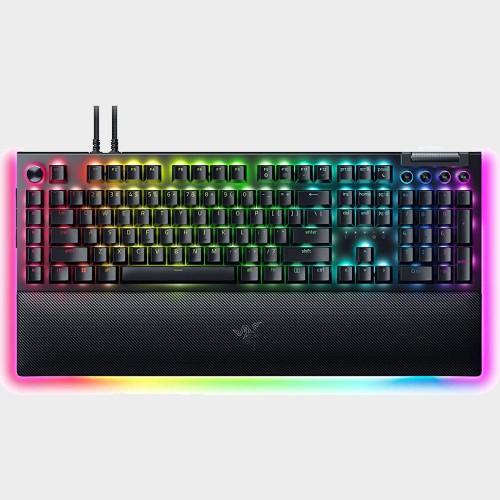
The Razer BlackWidow V4 Pro is a behemoth, but with a massive array of macro buttons, and super speedy response it's the brand's best work.
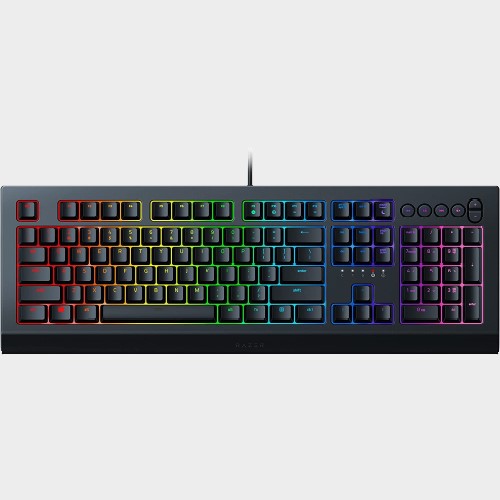
The membrane switched Razer Cynosa V2 is much cheaper than the rest of the brand's decks but it's still competitive and feels great under the hand as well.

Between 2.4GHz and Bluetooth connections, a super premium feel, and solid battery life, the Razer BlackWidow V3 Pro is the brand's best wireless option.
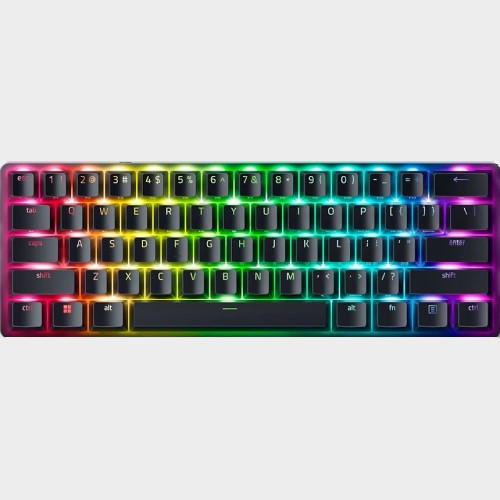
The customizable analog switches inside the Razer Huntsman Mini are a force to be reckoned with. Throw in a comfortable set of caps and this is the 60% Razer keyboard to buy.
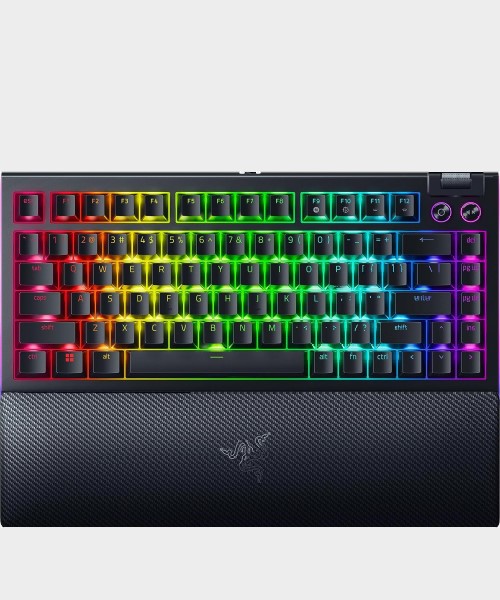
Hotswappable, gasket mounted, and with all the controls you'll need at your fingertips, the Razer BlackWidow V4 75% is a must-see.

The DeathStalker V2 Pro pairs slick low profile keycaps with a fantastic battery life and super smooth typing experience overall.

I've been hunting for the perfect keyboard for years, moving from the custom scene into the faster world of gaming (and dabbling back again every so often). A keyboard and mouse stan, with nearly five years of reviews at GameRadar+ under my belt, I'm looking for an excellent typing feel, actually useful extra features, and - above all else - value for money in every Razer keyboard I test.
Recent updates
February 20 - I have finally received the newer Razer BlackWidow V4 Pro 75% for testing, and its performance so far has been promising. While I'm still working on my full review, however, I have updated this page to include information on previously reviewed Razer keyboards for some comparison points.
The best Razer keyboard overall
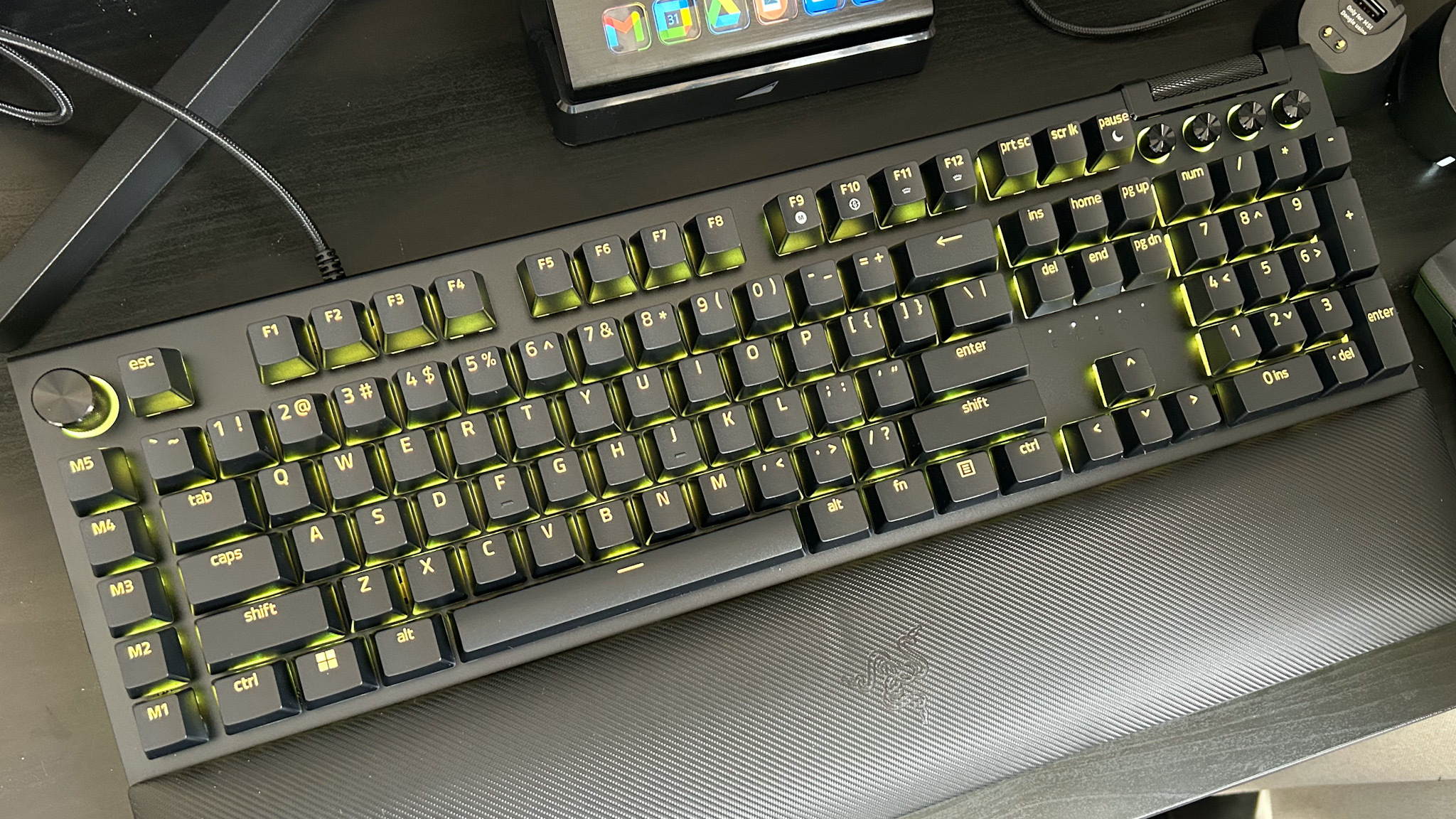

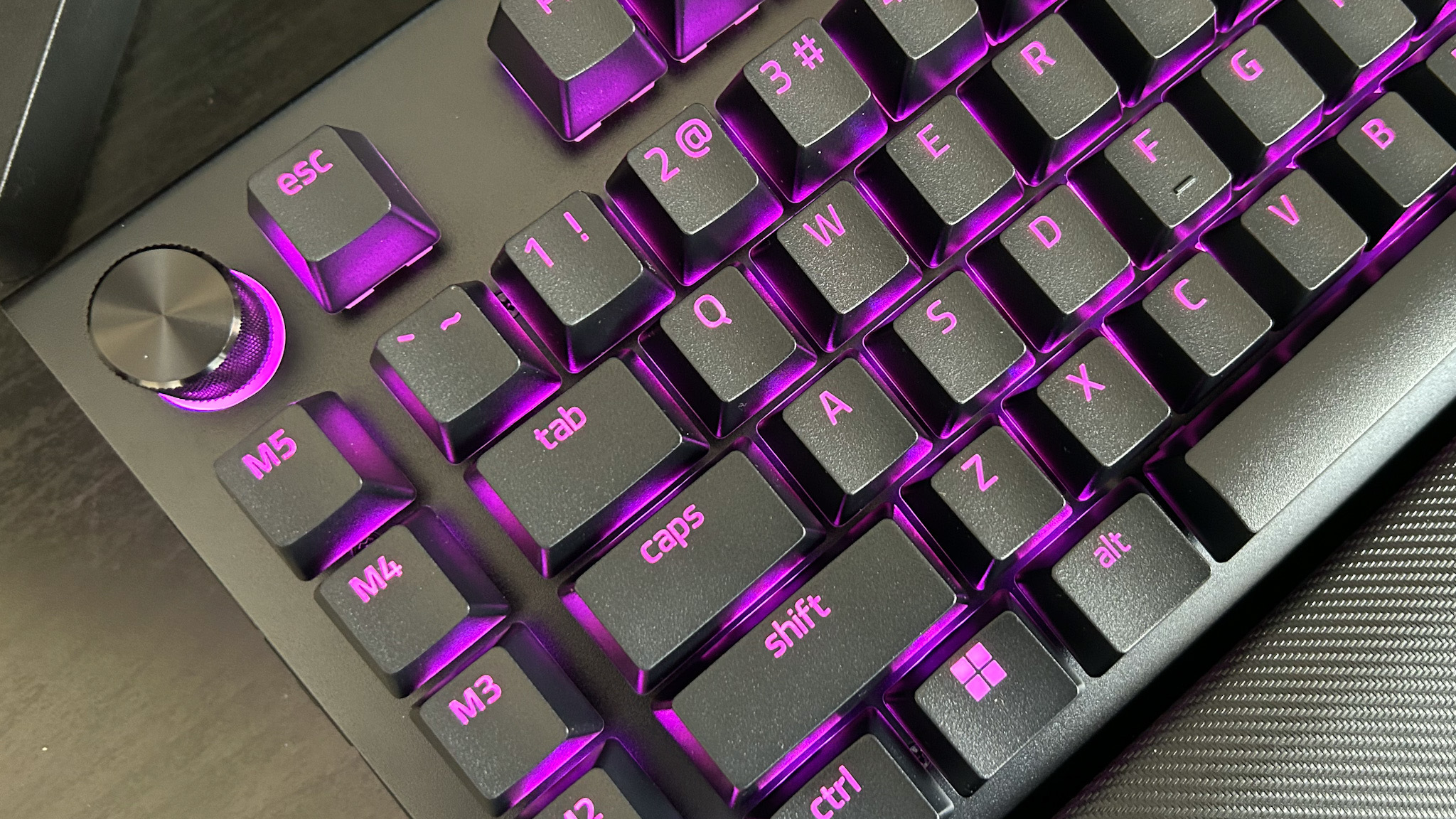
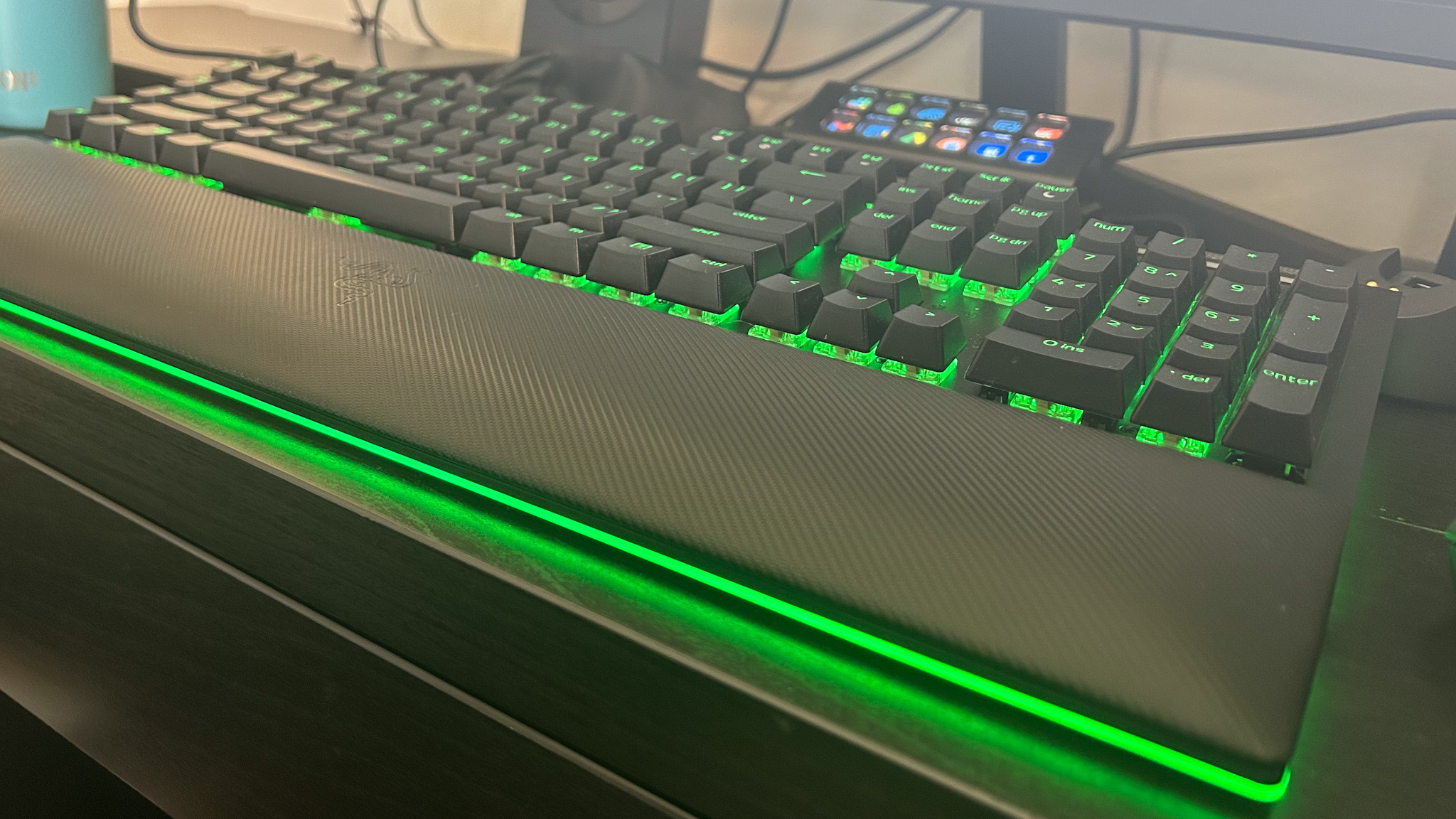
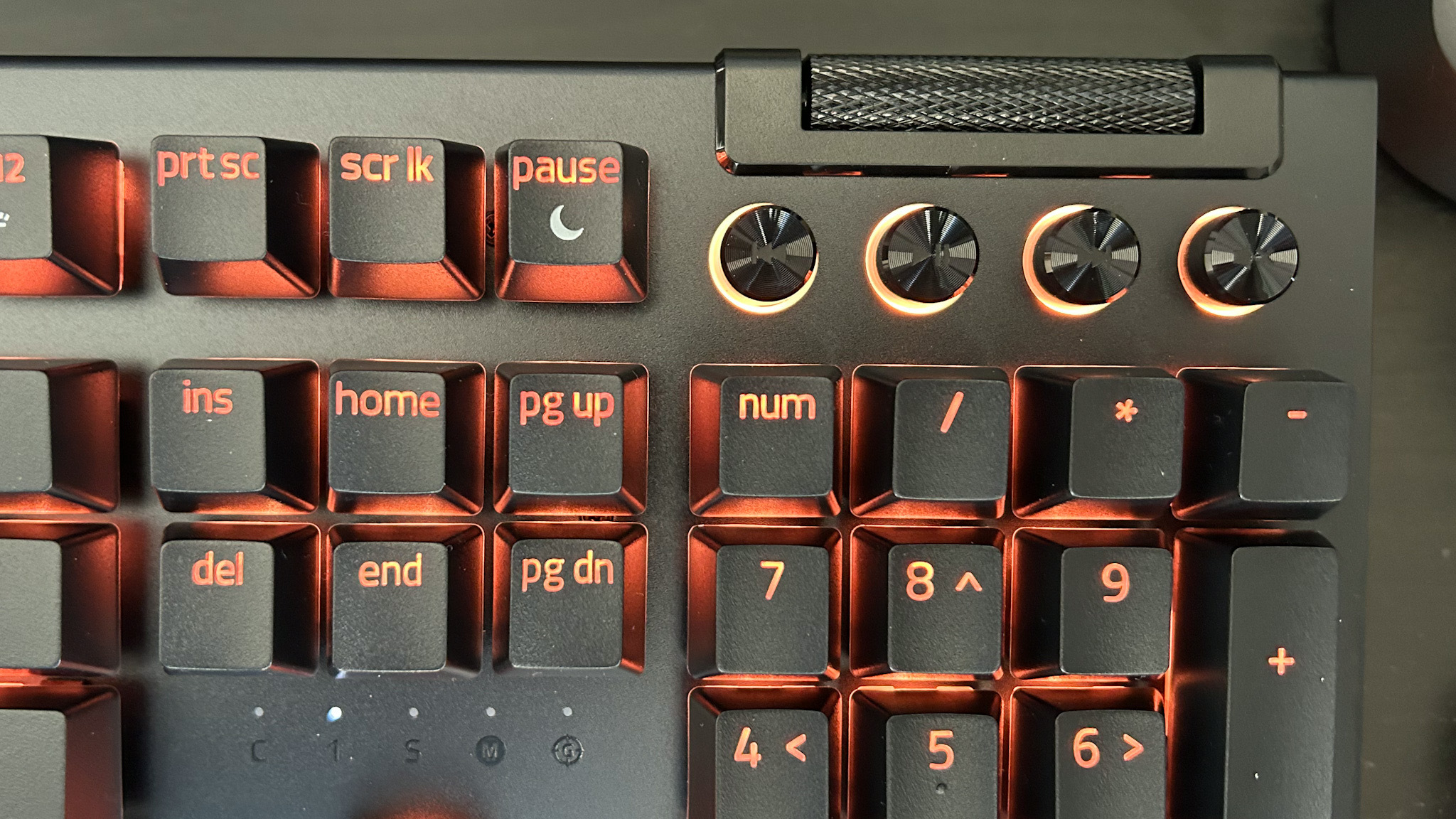
Specifications
Reasons to buy
Reasons to avoid
Boasting 8 macro buttons (5 up the left of the main deck and an additional 3 tucked away on the side of the chassis), the Razer BlackWidow V4 Pro is a command centre of a keyboard. That's true of its programmability and extra control features, but also of its sheer size. This is a full gaming keyboard and then some, squeezing onto our average sized desk with barely any room for a laptop down the side and a mouse swing. That means it's not going to be the best option for anyone with less space to work with, but it's certainly the best Razer keyboard for macro-heads.
If you're looking to invest in a full battle station, it really pays to splash out on Razer's latest release.
Razer BlackWidow V4 Pro review
There's plenty of room for customization in here, though I did feel the Command Dial (located above the five main macro buttons) was a little under-utilized. It's certainly packing even more macro functionality into the deck, with space for 100 different modes (toggled via a click) but the options available in Synapse are limited. Where you might want to sit down and spend some time assigning in-game actions, the location of the dial is a little too far away from the main deck to truly be useful.
However, this is simply an under-used blip in the corner of an incredibly impressive Razer keyboard. There's a speedy response to every keystroke here, worthy of tournament level precision, and a comfortable, satisfying feel and sound in the clickers as well. I was a little disappointed to see on a deck of this price, but they're nicely textured and feel far more premium than other cheaper caps. Add some slick RGB lighting running the full edge of the deck and even around the wrist rest as well, and you've got yourself a luxury device.
Yes, you're dropping the wireless connectivity of previous BlackWidow models (like the V3 featured below), but with USB passthrough and the sheer number of extra features packed in I'm willing to forgive the extra cable on the desk top.
Read more: Razer BlackWidow V4 Pro review
The best budget Razer keyboard
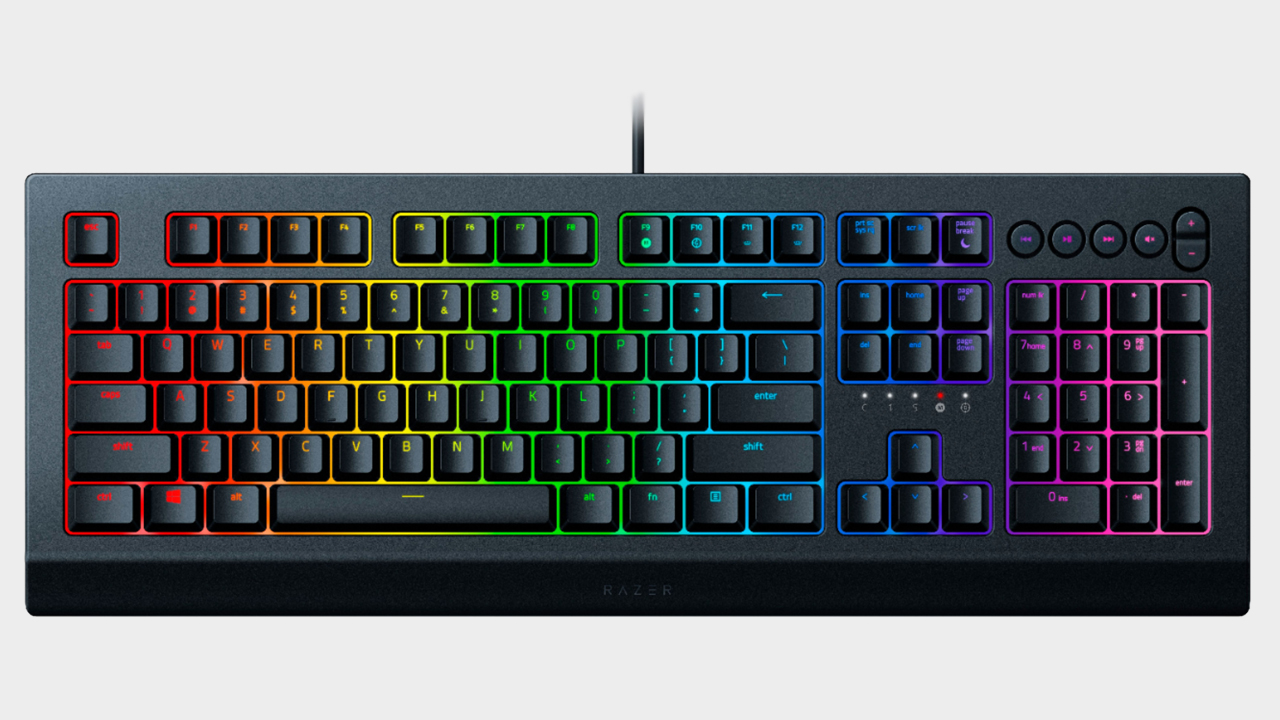
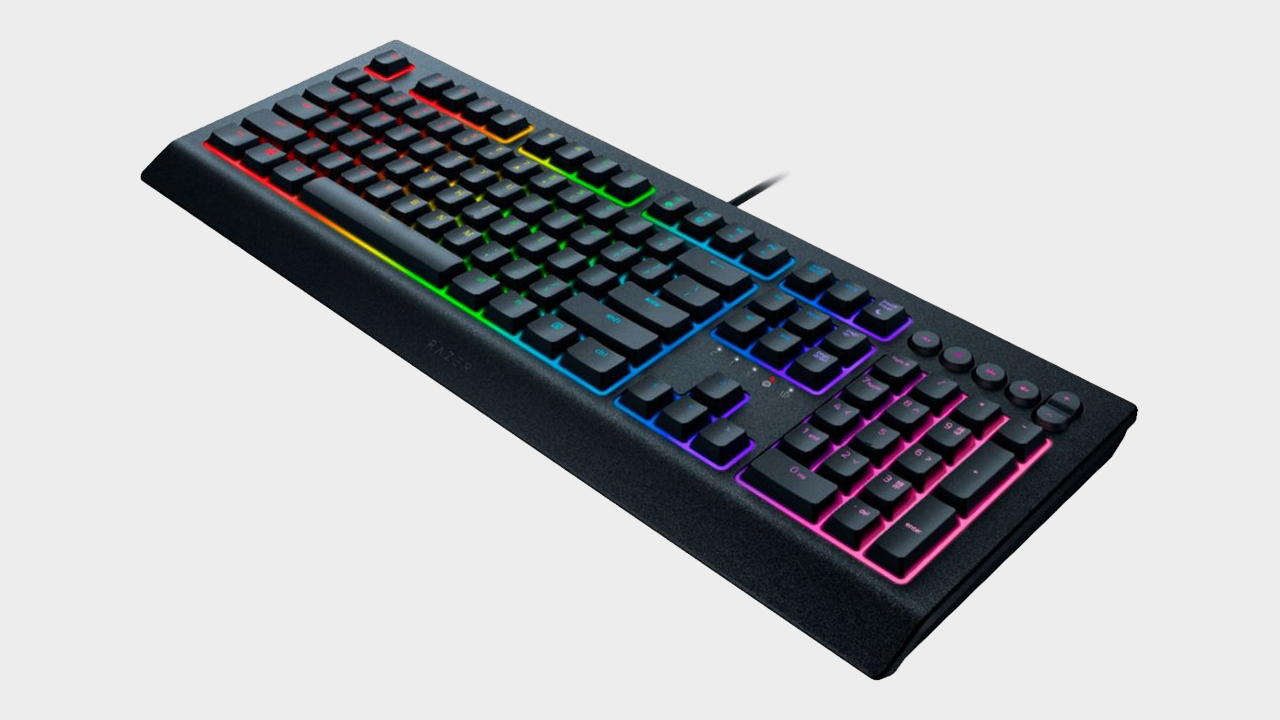
Specifications
Reasons to buy
Reasons to avoid
The Razer Cynosa V2 manages to feel great under your hands without breaking the bank - which isn't an easy find in the world of Razer keyboards. Not only is it one of the brand's best decks for value for money, but it's one of the cheapest models worth running on the whole market as well. While it holds an MSRP of $59.99 / £59.99, we actually see this model well under $50 / £50 regularly.
If you've never owned a gaming keyboard before, this is the perfect place to start.
Razer Cynosa V2 review
While these rubber dome switches are a little cheaper by nature, the Cynosa manages to implement them in a way that still feels tactile and responsive. Plus, you're keeping that quiet typing experience of a non-mechanical deck as well. It should be said, though, that in Ben's testing he did come across a few squeaky keys. While no means a deal-breaker, and certainly not a constant sound, the odd ting noise could become irritating if they build up over time.
You can still fly across the board with excellent actuation speed and response, which is more than can be said for the majority of budget gaming keyboards. Not only that, but you're also getting dedicated media controls and a full set of RGB LEDs as well.
The Razer Cynosa line is very similar to the brand's other budget range - the Ornata. The Cynosa won't take you past $50, but the Ornata, with its hybrid switches, media dial, and included wrist rest will run you closer to $80. While the Ornata may boast a few more specialized features, then, those looking for a true budget buy will be better suited to the value experience that the Cynosa V2 line offers.
Read more: Razer Cynosa V2 review
The best wireless Razer keyboard
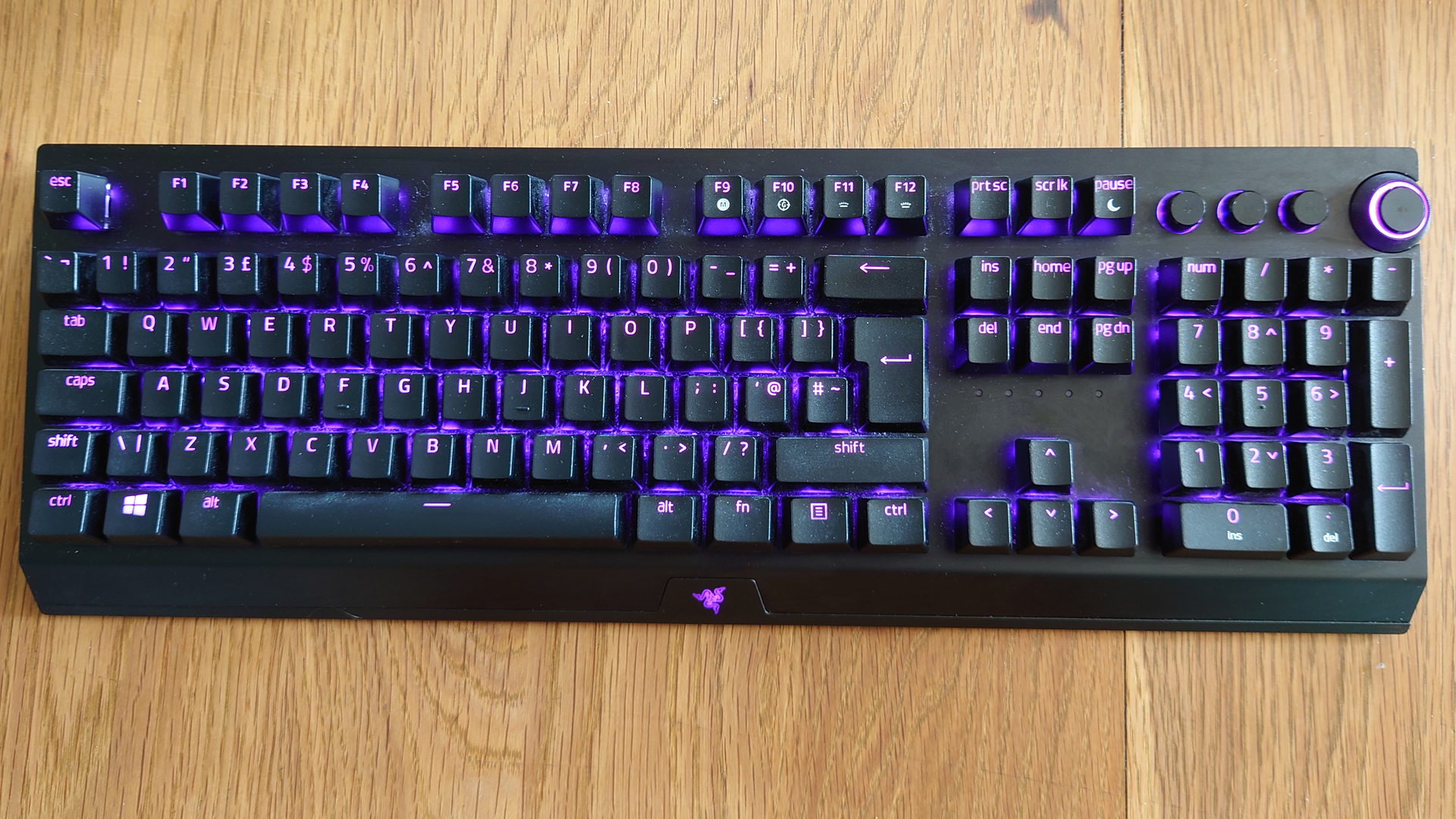
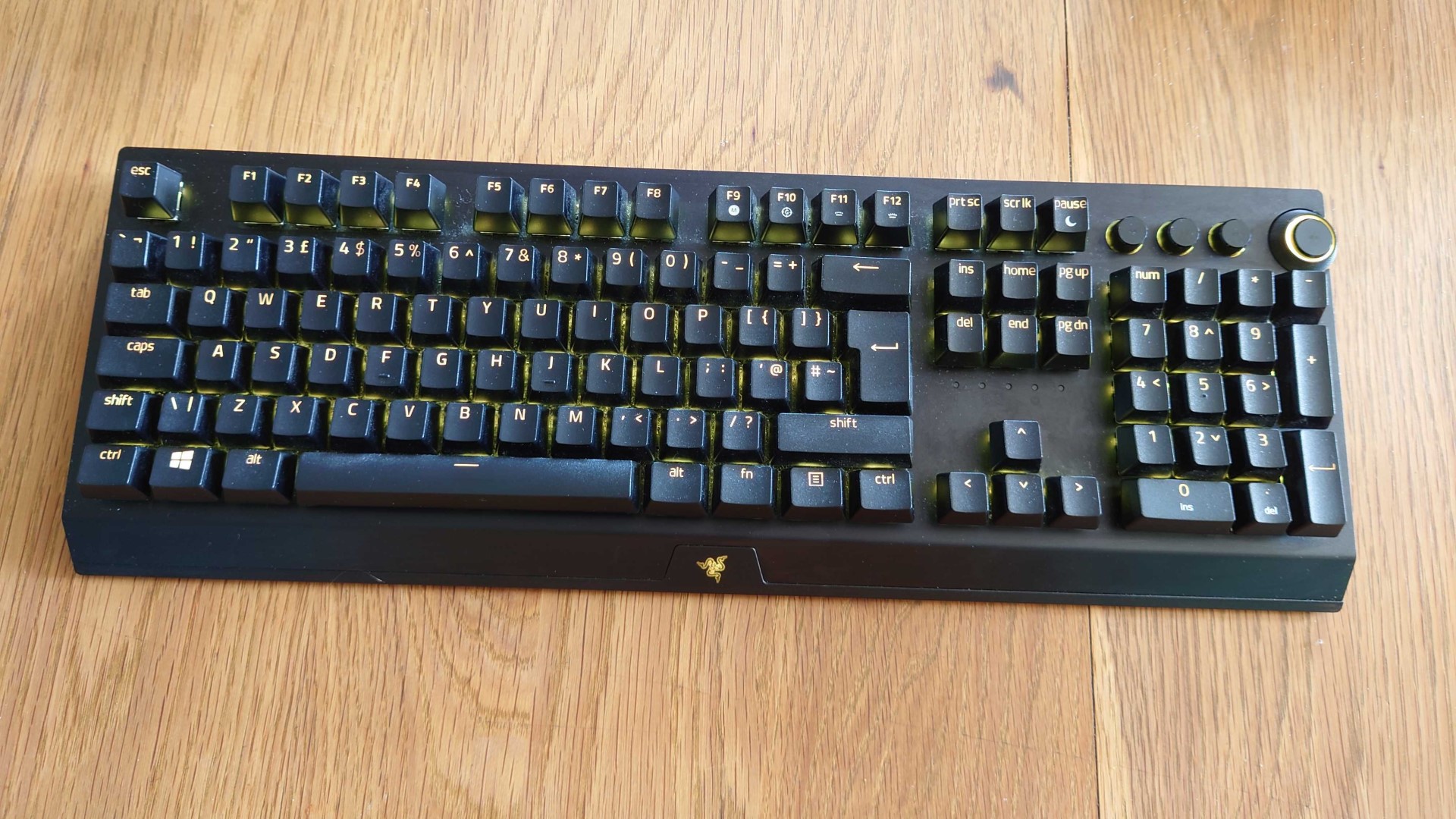
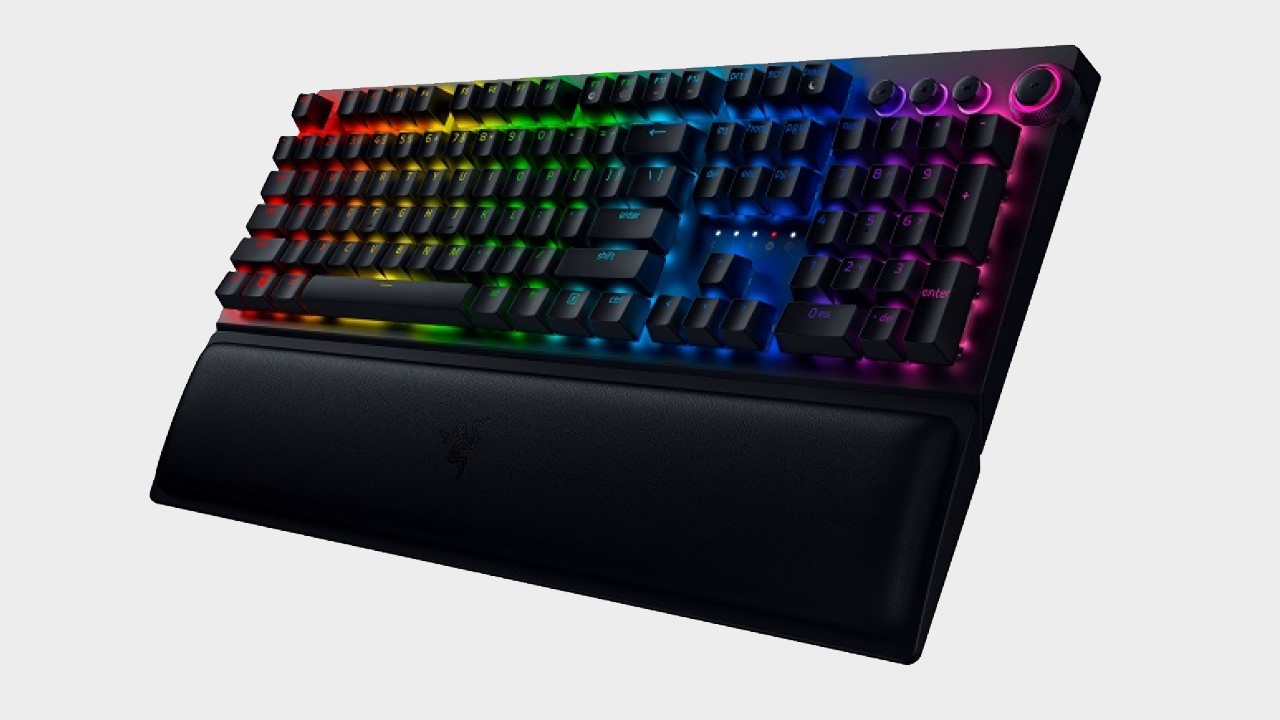
Specifications
Reasons to buy
Reasons to avoid
There's no doubt about it - wireless gaming keyboards are pricey. That means you'll want to make sure you're getting a good amount of luxury in your deck, especially if you're spending over $200 / £200. Thankfully, the Razer BlackWidow V3 Pro has bags of premium features packed in - all with a durable build quality and some nice to haves in the spec sheet as well.
Whether I'm wired in via USB C or connected wirelessly, the Razer BlackWidow V3 Pro delivers consistently great performance to where it is near impossible to tell the latency differences apart.
Razer BlackWidow V3 Pro review
Not only are you getting one of the nicest media wheels we've ever laid hands on with a full deck of premium Razer switches and all the Chroma you can expect from the snakes, but there's a solid wireless performance here as well. Whether plugged in or tether-free, our testers were impressed by the speeds on offer here. Gone are the days where wireless decks lag behind their cabled counterparts - the Razer BlackWidow V3 Pro absolutely flies.
You've got a choice between 2.4GHz and a Bluetooth connection here, but I'd recommend sticking with the 2.4GHz dongle for the best response times. Bluetooth wasn't exactly a trudge, but things are certainly zippier when directly communicating with that USB attachment.
Read more: Razer BlackWidow V3 Pro review
The best 60% Razer keyboard
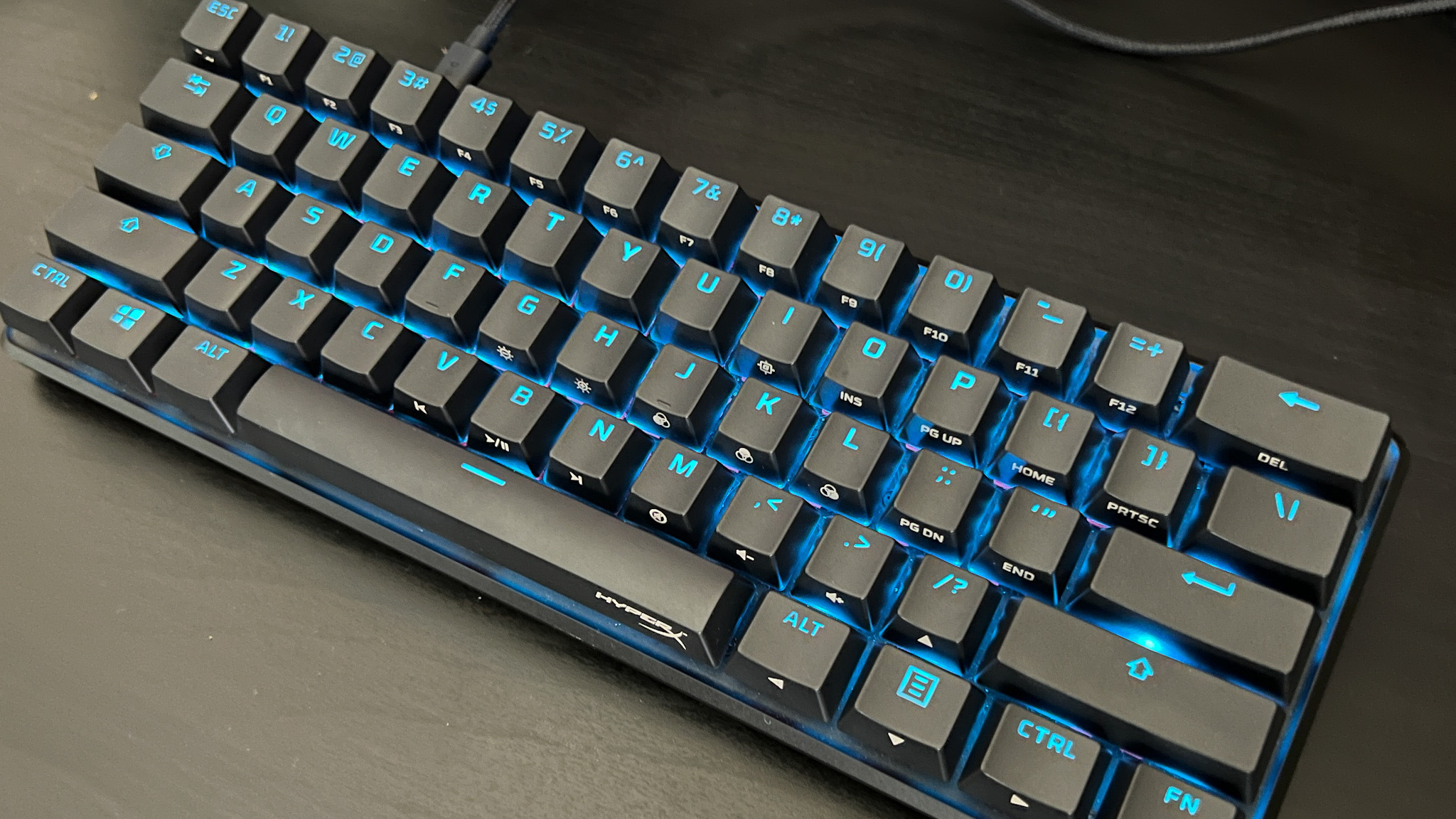
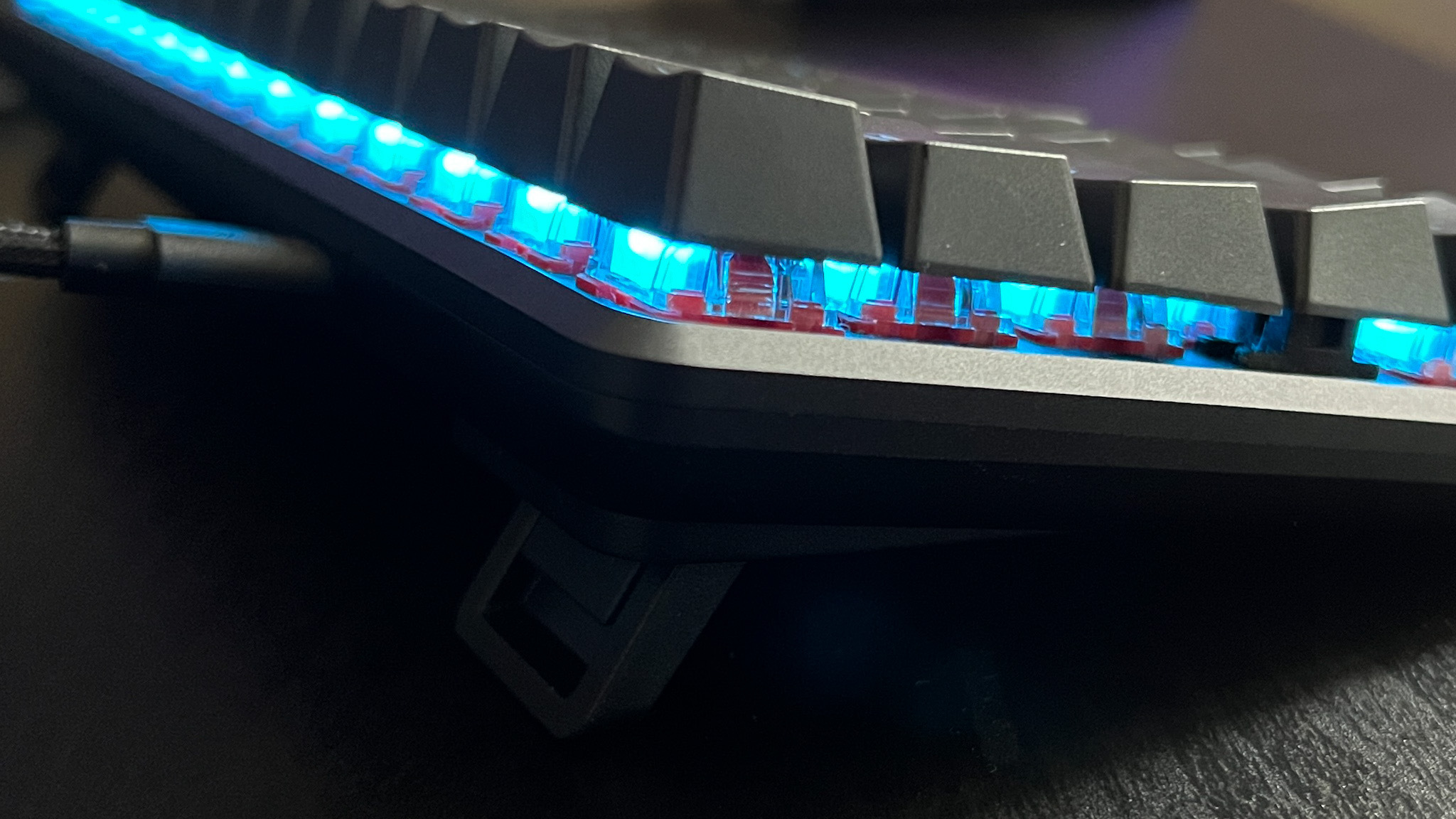
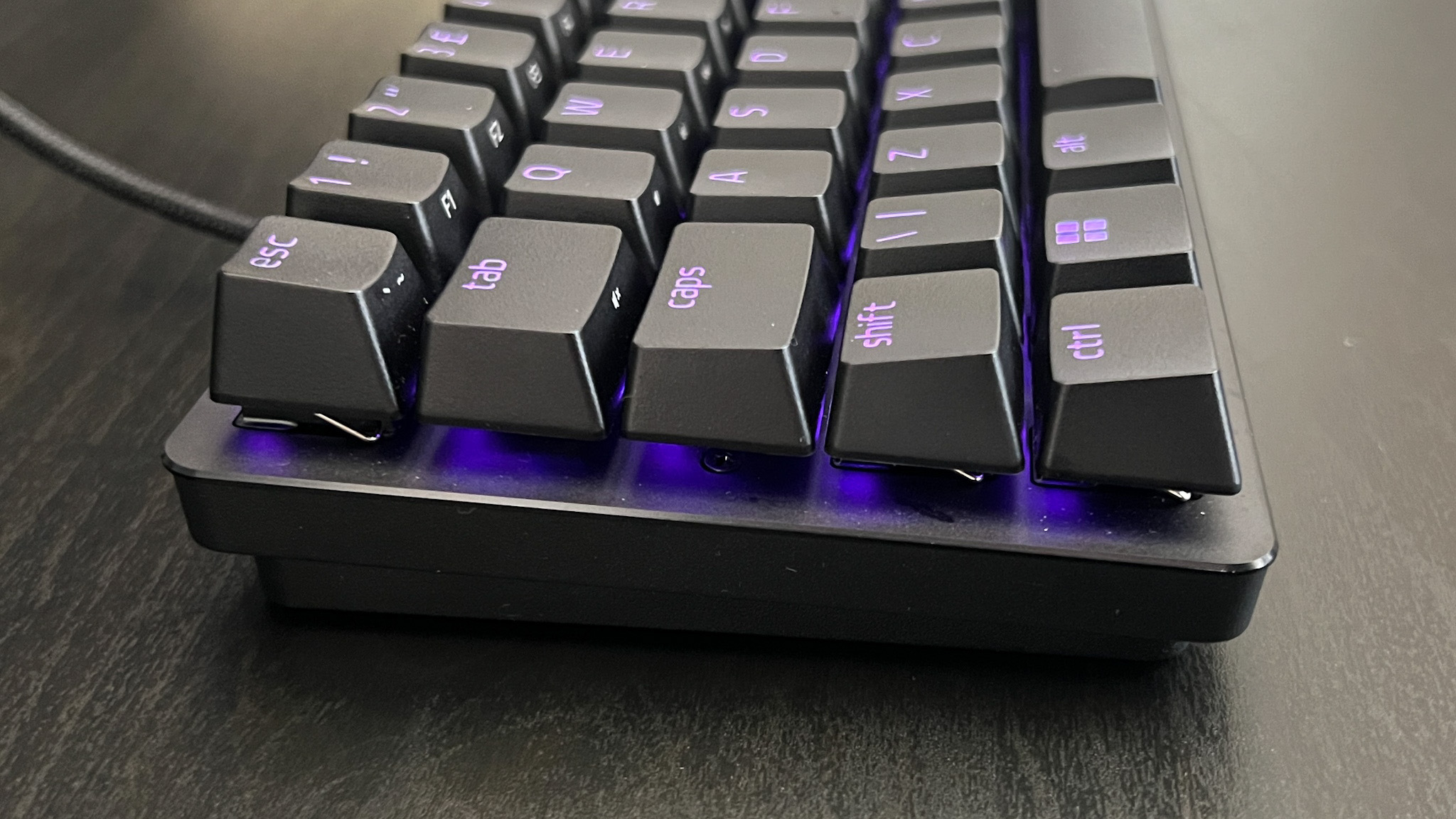
Specifications
Reasons to buy
Reasons to avoid
Don't let the size of the Razer Huntsman Mini Analog fool you - it's every bit the equal of its full-size counterparts. That's because it also features the same excellent Analog Optical switches for adjustable (and variable) actuation and dual-step macro mapping as the full-sized Razer Huntsman V2 below. It's a delight for typing and as speedy as you would expect from the eSports-focused design, but its main benefits lie in that customization.
For the curious collector the Razer Huntsman Mini Analog offers up an excellent proposition
Razer Huntsman Mini Analog review
You're able to set your own actuation point here, which means you can opt for a more sensitive 1.5mm to a heavier 3.6mm. That means you're sorted whether you rely on the tap of a twitch reflex or prefer a more satisfying press to your keys. I found the perfect sweet spot somewhere in between these points, but a lighter touch comes in particularly handy during high octane Apex Legends moments.
Not only can you adjust each key's behavior in this way, but you can also set certain keys to act in a manner more similar to a thumbstick. A usual mechanical keyboard switch will register an on or off input, responding with a single command to the computer as a result. However, the Huntsman Mini Analog registers the pressure placed on each switch in as - you guessed it - analog manner, using light-based actuation. That means you can, for example, set your WASD keys to respond with movement speed based on how far you're pressing the switch.
It's a little fiddly to set up (and it's not fully supported by all games particularly well), but once you've mastered this feature it's a real game-changer.
The smaller footprint means it's easy to transport as well, making this the ideal choice for tournament use or those who travel a lot. It's also a good pick if you want to use it on one of the best gaming laptops, as it doesn't take up a huge amount of space. If you're not fussed about those analog switches, though, you can also pick up the Razer Huntsman Mini with standard opto-mechanical clickers underneath as well.
Read more: Razer Huntsman Mini Analog review
The best 75% Razer keyboard
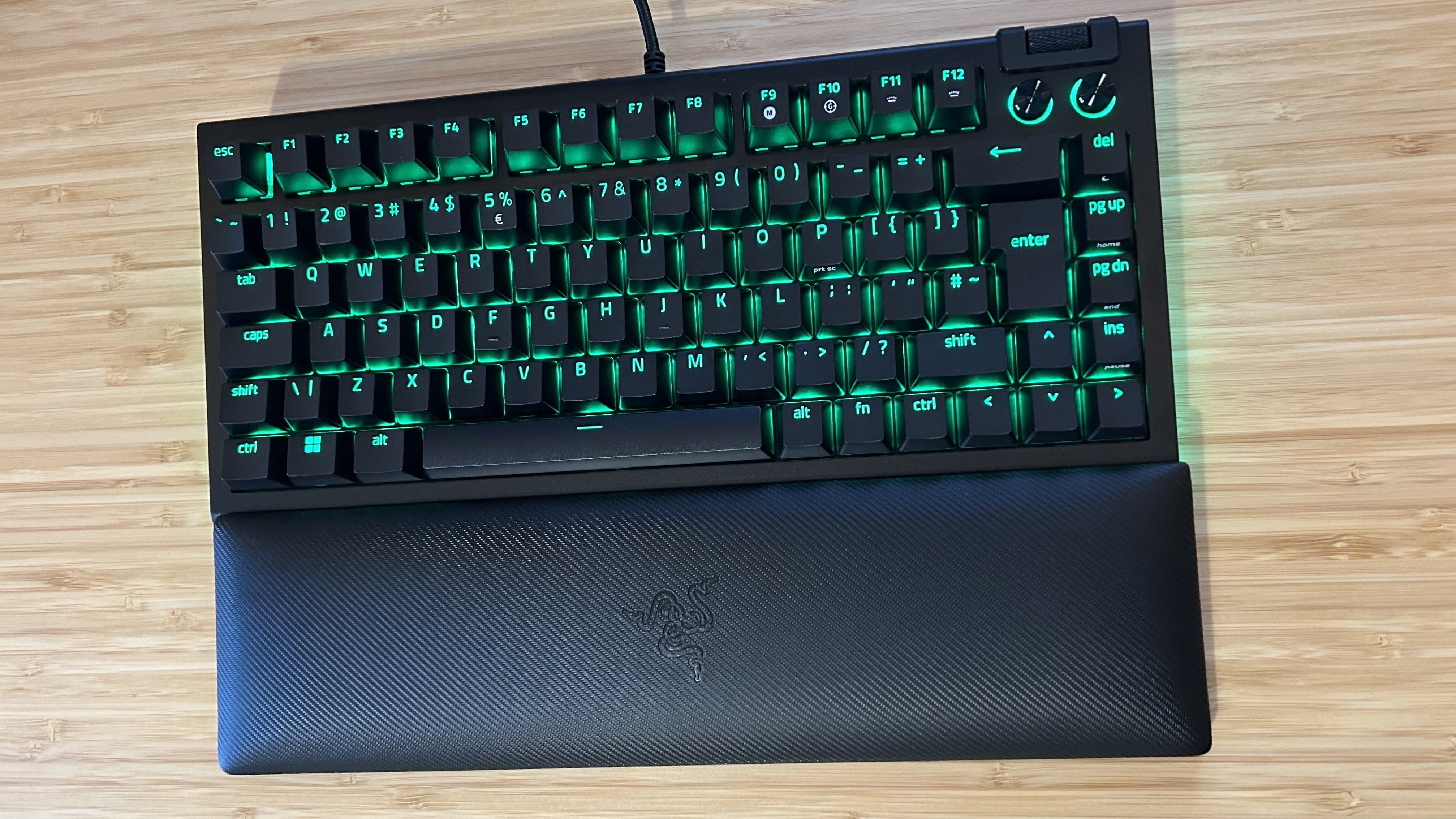
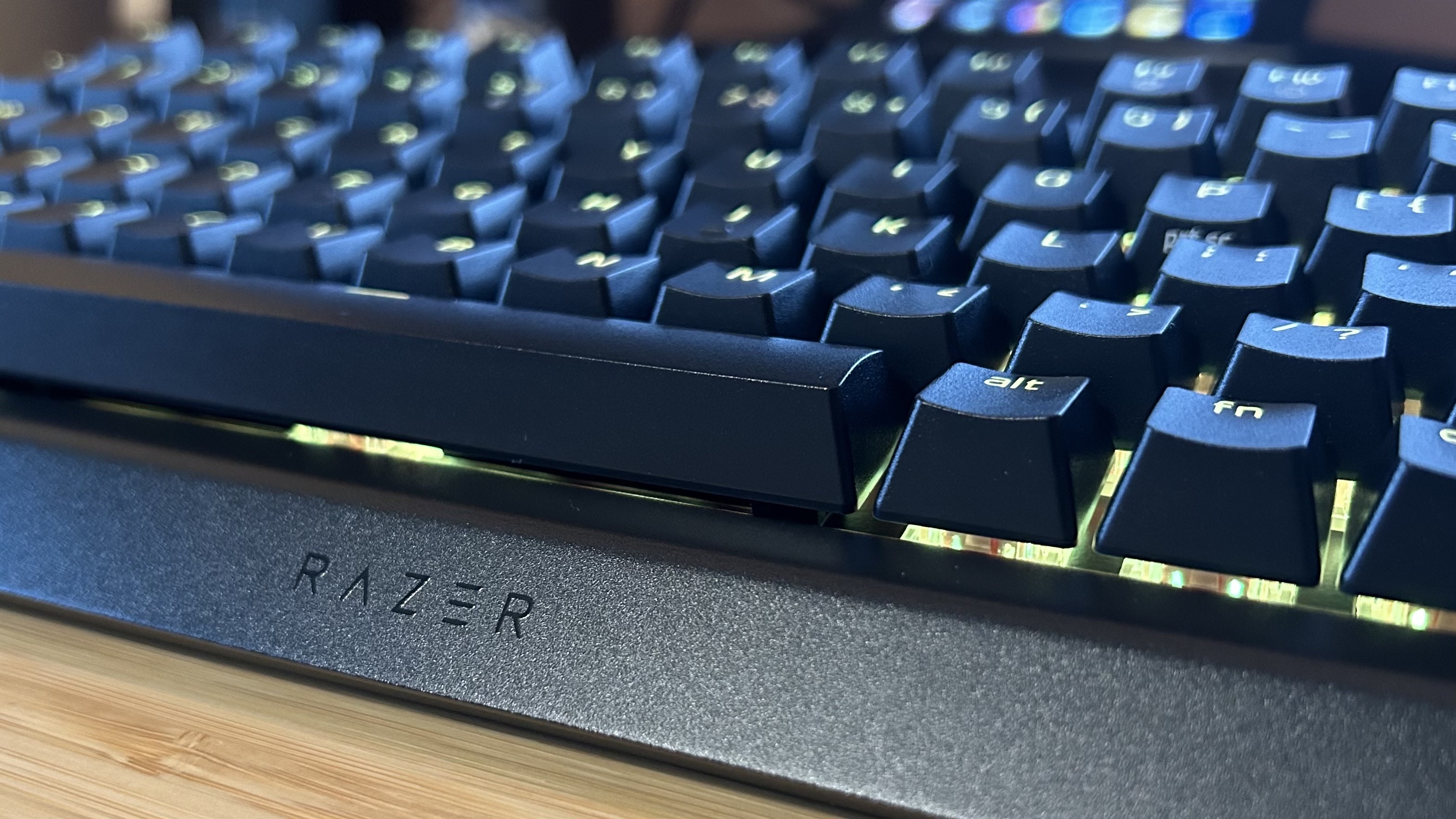
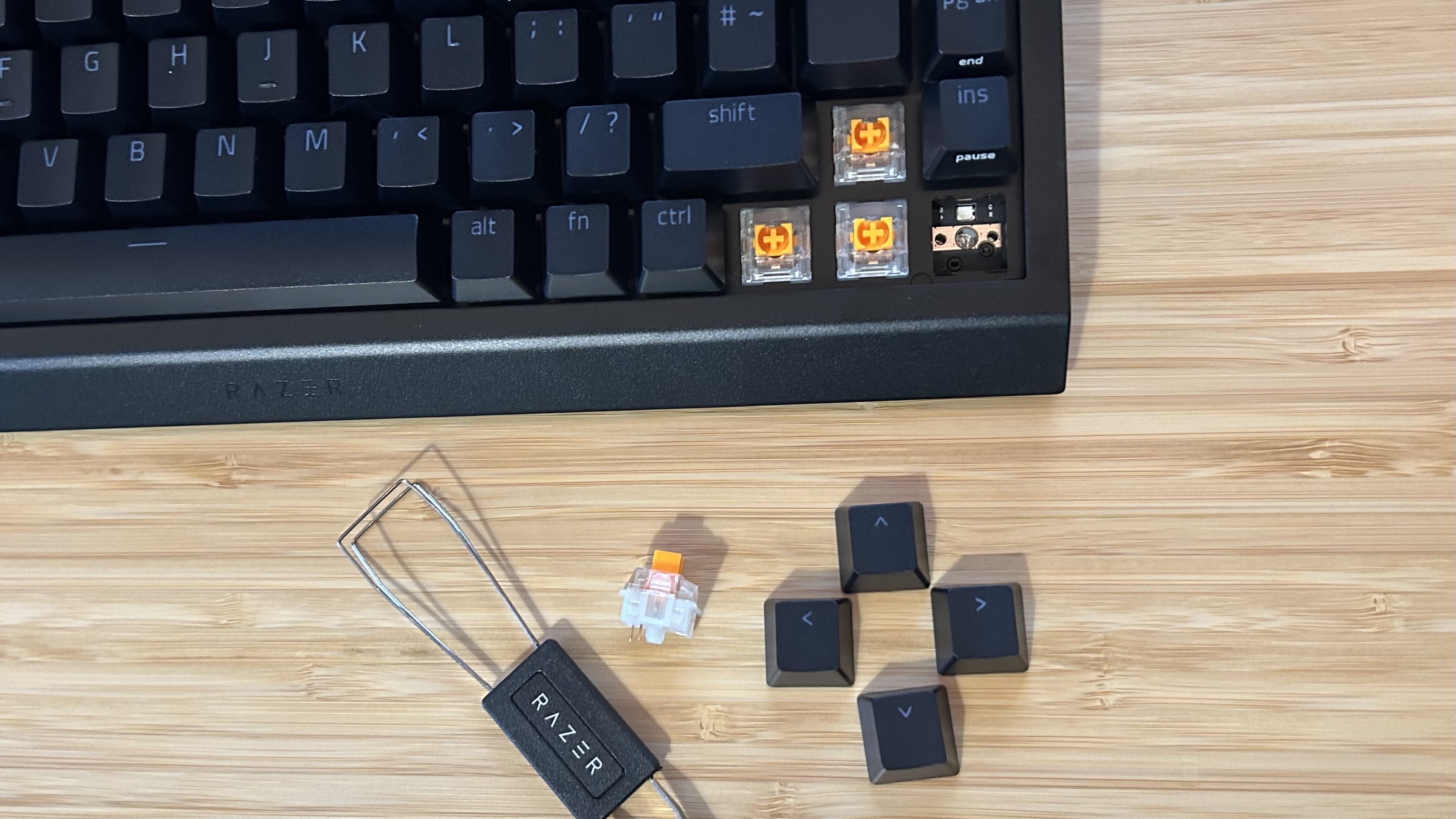
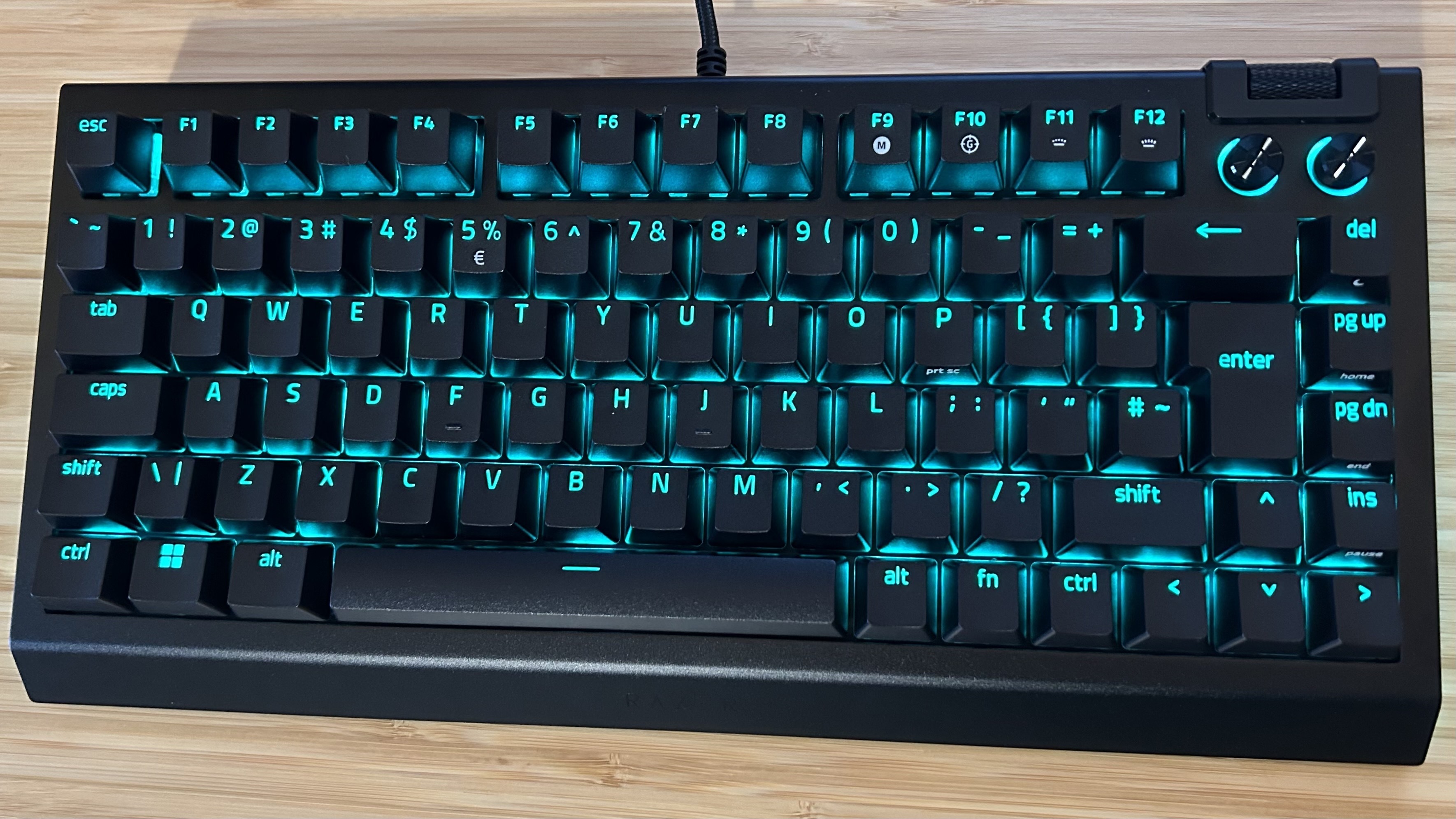
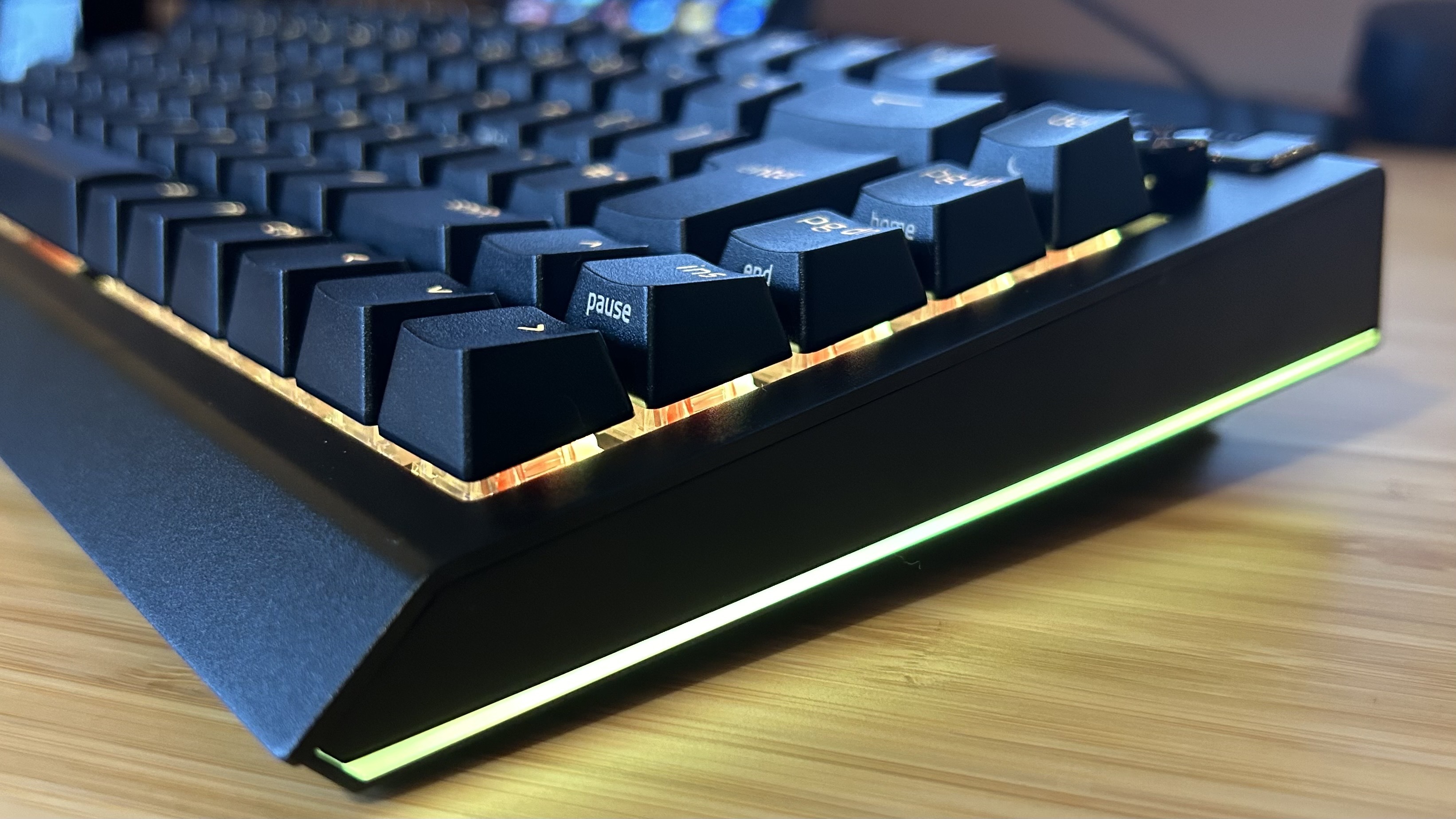
Specifications
Reasons to buy
Reasons to avoid
The Razer BlackWidow V4 75% is not only a rare smaller form factor Razer keyboard, but it's also the first to offer hot-swappable switches. That means you can easily unplug the stock Razer clickers that come installed for a different sound or feel, or replace them when they're worn through.
The actual deck looks and feels like a miniature BlackWidow V4, with its LED light strip around the edge (though not the included wrist rest), wedge shape, and matte black finish. Not only that, but inside you'll find a full gasket mount design with additional tape modding for a better sound and feel to each keypress.
Under the hood, 8K polling means everything runs super snappy - though only the speediest of players will be making use of this particular feature. The layout itself means you've still got space for those all important arrow keys (a set of dedicated buttons that 60% options remap as an additional function layer to other keys) as well as media playback. Like in the full sized release, we did notice that those media keys are particularly difficult to see.
The BlackWidow V4 75% is hot-swappable, but considering just how good the Razer Orange Tactile mechanical switches are, I'm not diving into the PCB any time soon. Everything is particularly snappy here, with a super soft landing to each keypress and no rattle. You'll often hear the stabilizers ping in other Razer keyboards, but thanks to the extra sound absorption everything is silky smooth here.
Read more: Razer BlackWidow V4 75% review
The best low-profile Razer keyboard
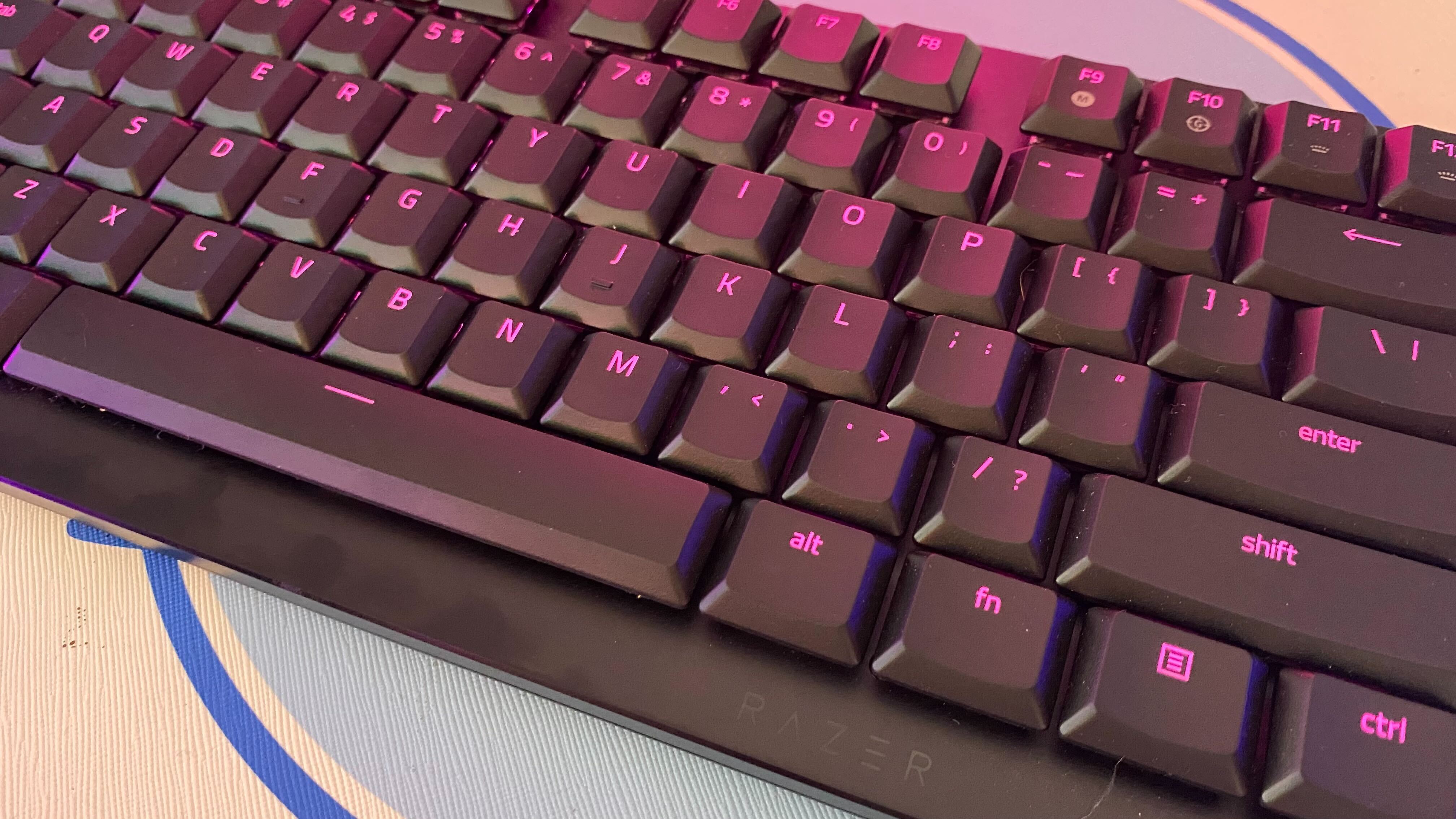
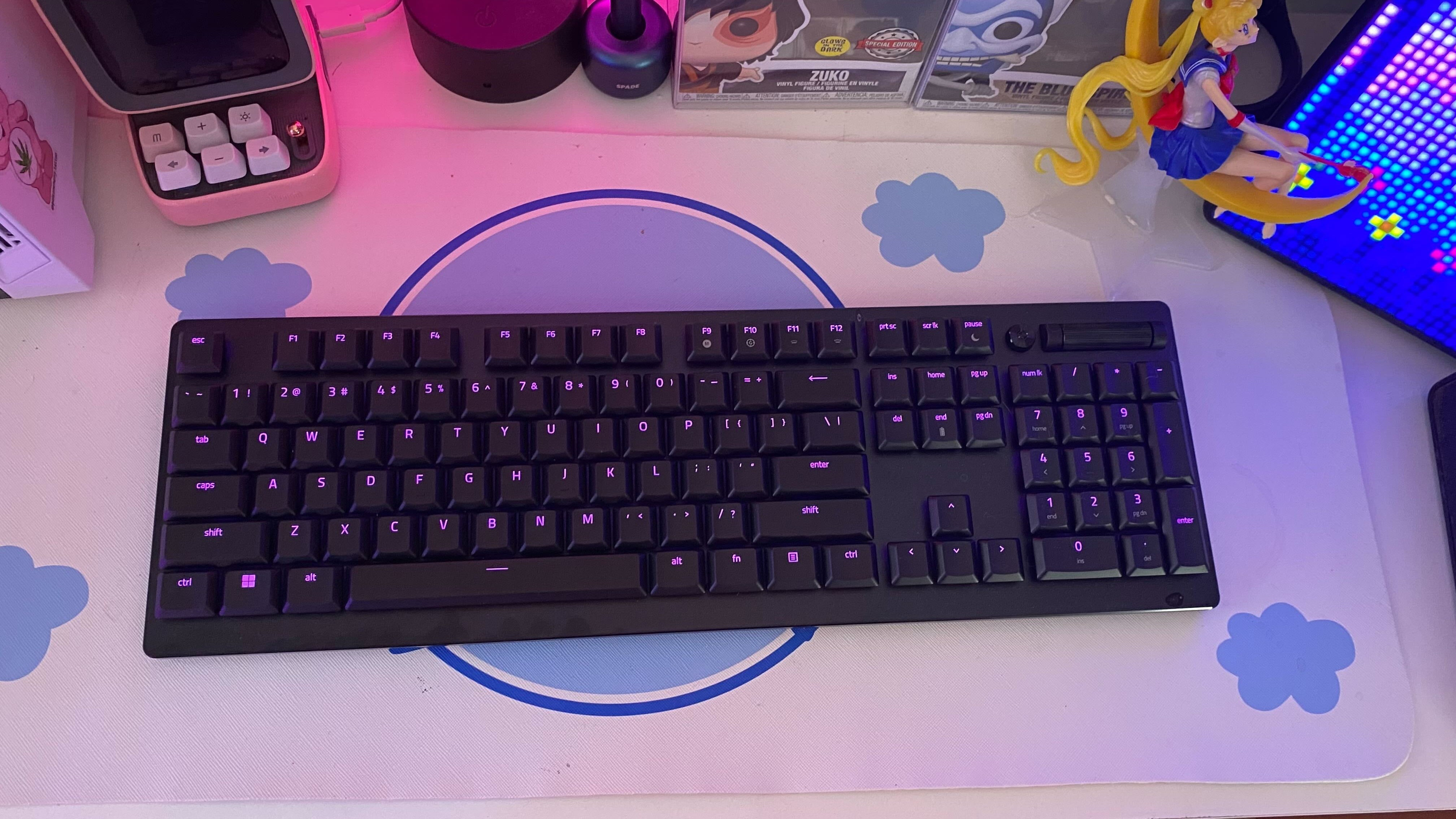
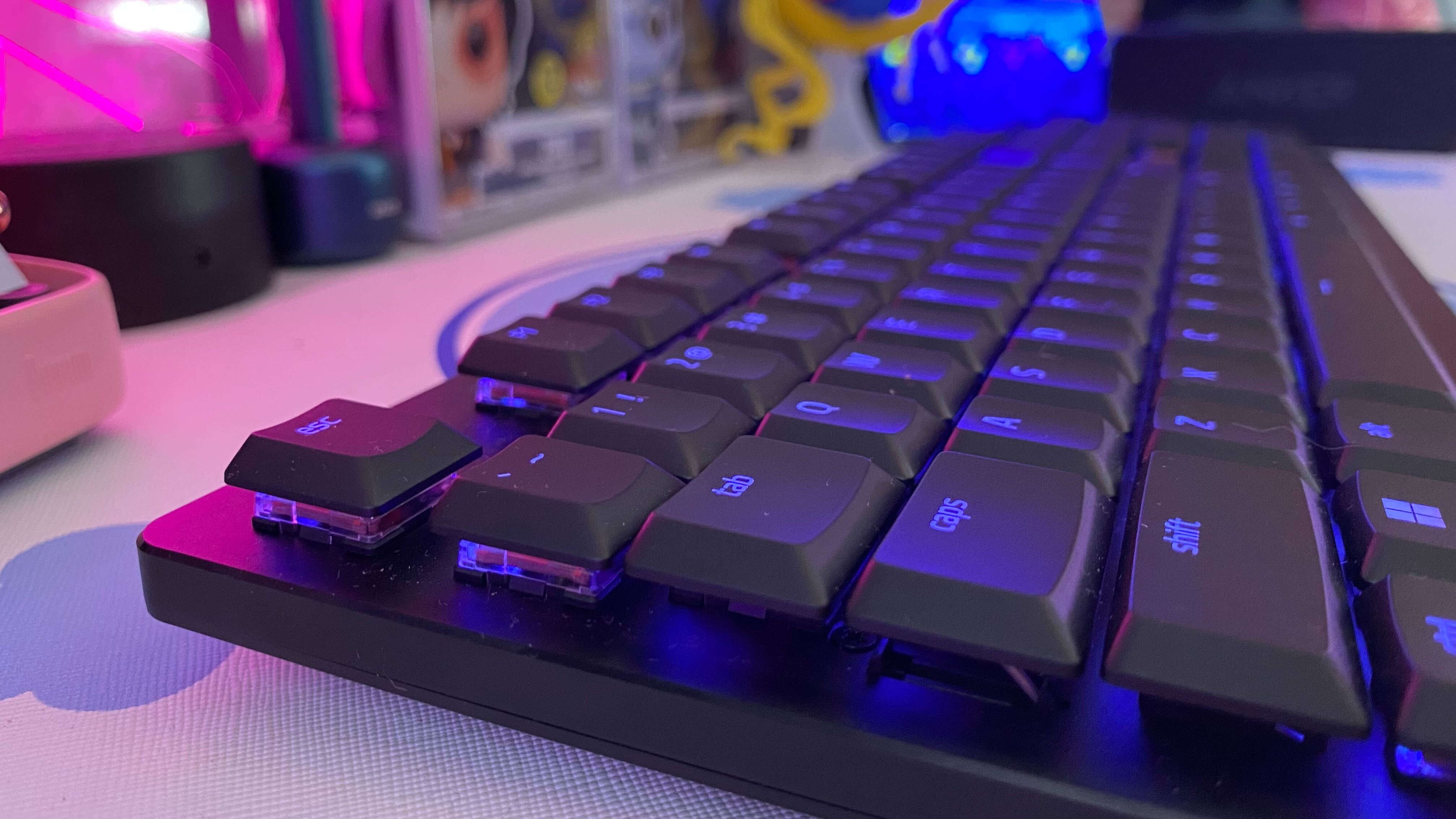
Specifications
Reasons to buy
Reasons to avoid
The Razer DeathStalker V2 Pro delighted in our testing. It's been a while since the low profile design has graced the brand's shelves, but if you're looking for that quick snap and super crisp optical switch, the latest release is well worth a look. Not only is this one of the best Razer keyboards overall, but our testers actually found it's the best specifically for typing - all thanks to those shorter keycaps and streamlined design.
As someone who types for a living, this is one of the best keyboards I have ever used.
Razer Deathstalker V2 Pro review
Yes, these are particularly sensitive switches - something our reviewer struggled with in the early days. However, with a little muscle memory they were soon flying across the deck, and started to value such twitch-reflex reactivity in both work and play. Not only is this a solid piece of kit in itself, but the DeathStalker V2 Pro is also one of the few wireless options from Razer. The brand promises a 26 hour battery on full brightness, with 200 hours at no RGB. This rang true during our own use - clocking an average 27 hours per charge with LEDs blaring at full whack.
While there's no USB passthrough or wrist rest included (a shame at a full $249.99 MSRP), you're getting a sophisticated piece of kit here, with a lick of luxury on top. From the shorter profile to the sleek Razer branding along the larger bottom bezel, the DeathStalker V2 Pro certainly stands out in a setup. If you're looking to invest in a low profile Razer keyboard, this is your best option.
Read more: Razer Deathstalker V2 Pro review
How we test Razer gaming keyboards

We adopt each Razer keyboard as our own whenever a new model comes our way for review. That means we can make recommendations based on not only hands-on experience, but also the quality of life of a product. We use each Razer keyboard we review for work and play over a considerable amount of time, while also running a series of tests designed to stress a keyboard's performance through a range of genres.
In particular, we're always making sure key features like the n-key rollover and scan rates are true to the brand's marketing, while also testing response times, debounce, switch speeds, ease of macro use, travel and more during our use.
Because we use these devices every day, we're always keeping an eye on that form factor and durability as well - watching out for any flexible parts or switch wobble. However, once our initial review is finished we will continue to keep these Razer keyboards in our rotations so that we can determine long-term build quality and update our findings as well.
For more information on how we make our recommendations, take a look at our full GamesRadar+ Hardware Policy. You'll also find more details on how we test gaming keyboards specifically as well.
Also tested
Razer Huntsman V3 Pro | Available at Amazon
As a full sized wired gaming keyboard, the Razer Huntsman V3 Pro goes up against the BlackWidow V4 Pro. It's dropping a few of the extra features that makes the BlackWidow so great, though, and comes in at a similar price point.
Read more: Razer Huntsman V3 Pro review
Razer BlackWidow V3 Mini Hyperspeed | Available at Amazon
The Razer BlackWidow V3 Mini Hyperspeed is actually one of the cheapest wireless keyboards I recommend, with its age dropping prices below $100 regularly. It doesn't offer the same kind of functionality as the Huntsman Mini Analog, however.
Read more: Razer BlackWidow V3 Mini Hyperspeed review
Razer Huntsman V2 Analog | Available at Amazon
The Razer Huntsman V2 Analog was one of the first mainstream keyboard releases to feature Hall effect-like functionality. Its analog switches can mimic the feel of a joystick with multiple triggers at different actuation points. It's still pricey even today, though.
Read more: Razer Huntsman V2 Analog
Razer Huntsman V2 | Available at Amazon
Regularly on sale for far less than its $249.99 MSRP, the Razer Huntsman V2 still holds up as a fantastic full-sized deck. It's older, though, and a little difficult to find in new condition as a result.
Read more: Razer Huntsman V2 review
How to choose the right Razer keyboard
You'd think narrowing down to a particular brand would make the buying process a lot easier, but Razer has so many different models on the shelves it can still be tricky nailing down the right deck for you. Between wired and wireless connections, a multitude of different switch types, and form factors ranging from 60% to chunky full-sized models, there's a lot to choose from. I've bought my fair share of keyboards over the years, though, and in general all these decisions come down to three questions:
What size do you want?
You can focus on speed if you're a competitive player, or macro functionality if you're on MMOs, but one of the biggest factors you'll want to consider first is the footprint of your device. A full-sized deck can be unwieldy, especially in a smaller setup, but if you also want to double up for productivity that number pad is going to be invaluable. Plus, dedicated macro and media control keys are far more common in this form factor. However, a 60% deck can be prohibitively tiny, dropping your arrow keys and doubling up most extra functions onto an extra layer of control.
I'd recommend getting as many keys as you can in there while still saving space in your setup for wilder mouse sweeps. That means your size is going to depend on how much desk space you realistically have.
Which games do you play?
Razer provides a variety of different switches and customization options with each keyboard it releases, but narrowing down which selection makes most sense for you starts with your game library. If you play faster FPS titles at a more competitive level, you'll likely benefit from a faster switch and fancier variable actuation features. If you're more casual and tend to play slower strategy titles it's worth investing more in a set of dedicated macro buttons or more keybinding options.
If you're a generalist, it's worth prioritizing functionality over speed. All of Razer's gaming keyboards are going to be fast enough to keep up with everyday play by default (gaming keyboard polling rates don't generally need to move beyond 1,000Hz no matter what the brand tells you).
Do you mind a wire?
Once you've nailed your form factor and use-case, it's time to get to the big question; do you go wireless. A wireless keyboard is great for travelling a little lighter and keeping your desk clutter free. The majority of the best models on the market are wireless, it's the better connection option overall.
However, if you don't want to move your keyboard and you're happy with a cable running through the middle of your setup you can save plenty of cash by opting for a more traditional connection method.
FAQ
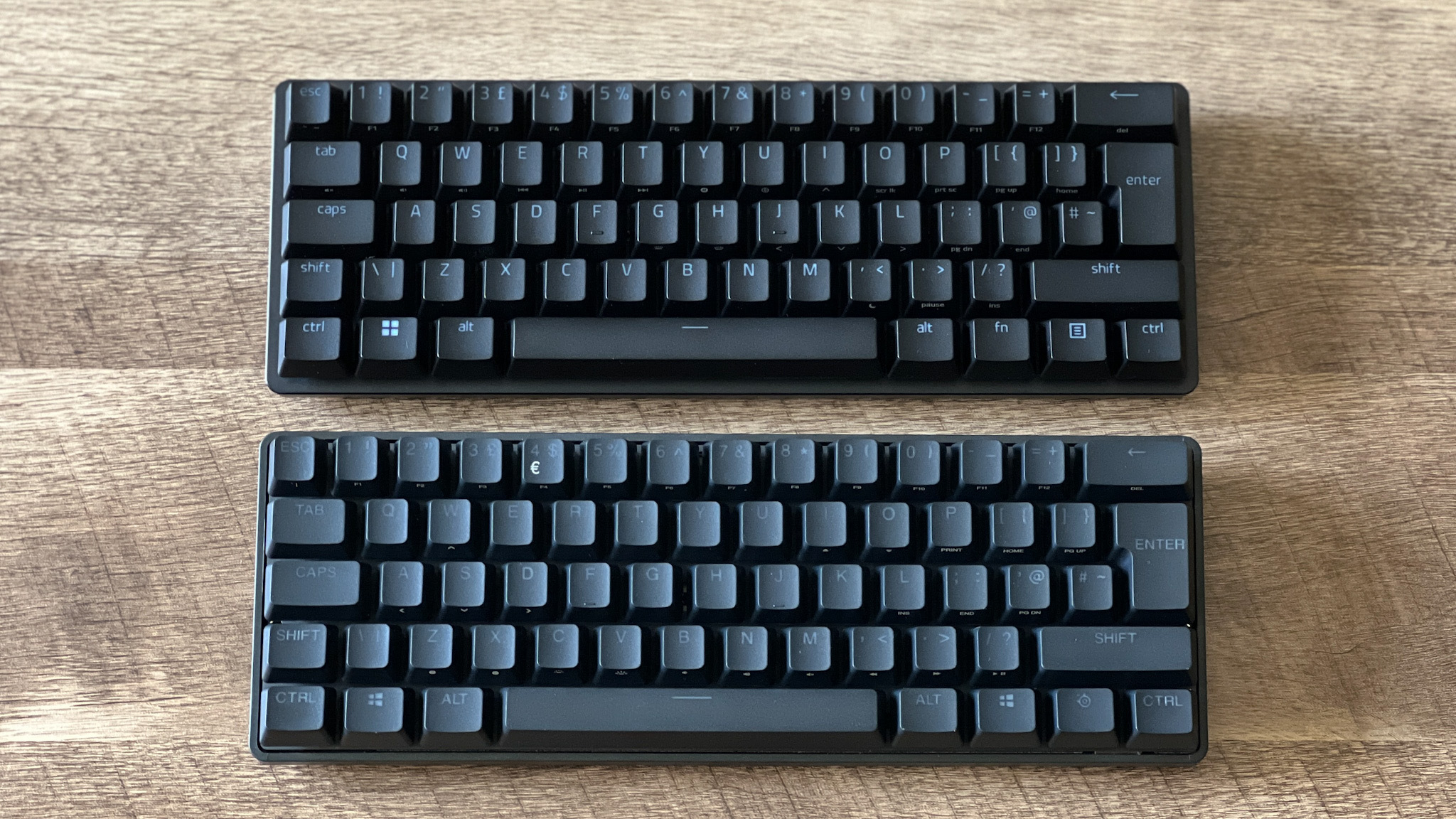
What is the best Razer keyboard?
The best Razer keyboard from all my testing is the Razer BlackWidow V4 Pro. While a premium package, this model packs a huge amount of additional features into its full-sized form factor.
What is the latest Razer keyboard?
The very latest Razer keyboard is the BlackWidow V4 Pro, launched in February 2023. However, you'll find all the newest releases in each of Razer's keyboard lines just below.
Deathstalker - Deathstalker V2 Pro (July, 2022)
Ornata - Razer Ornata V3 (June, 2022)
Hunstman - Razer Huntsman Mini Analog (March, 2022)
BlackWidow - Razer Blackwidow V4 Pro (February 2023)
Cynosa - Razer Cynosa V2 (July, 2020)
Are Razer keyboards worth it?
Razer keyboards are build for gaming from the ground up. That's why you'll usually find some of the fastest switches and heaviest RGB support from these planks. On top of a renowned build quality, the Chroma RGB system is compatible with a massive range of external services.
If you're planning on buying a keyboard primarily for typing, we'd recommend looking elsewhere - or the best hot-swappable keyboards. The switches and stabilizers often found in Razer's keyboards are designed for speed over stability. While you'll find some solid feeling keys at the top of the price range, those who don't need the additional gaming features can get far superior typing feel for much less cash with other brands.
Are Razer keyboards just for gaming?
While Razer does offer a massive range of excellent gaming keyboards, the brand also has a solid range for the office as well. The Razer Pro line comprises a keyboard and mouse that does away with some of the more speed-focused features and concentrates on a more subtle aesthetic. However, there are uses for Razer gaming keyboards in a productivity setting as well.
I'd recommend making sure the keystrokes aren't too loud - some of the mechanical switches in these decks can be too distracting for use in a shared space.
Of course, we're also rounding up all the best cheap gaming keyboards currently on the market, as well as the best gaming mouse models and the best Razer laptops to boot.
Sign up to the GamesRadar+ Newsletter
Weekly digests, tales from the communities you love, and more

Managing Editor of Hardware at GamesRadar+, I originally landed in hardware at our sister site TechRadar before moving over to GamesRadar. In between, I've written for Tom’s Guide, Wireframe, The Indie Game Website and That Video Game Blog, covering everything from the PS5 launch to the Apple Pencil. Now, i'm focused on Nintendo Switch, gaming laptops (and the keyboards, headsets and mice that come with them), PS5, and trying to find the perfect projector.
